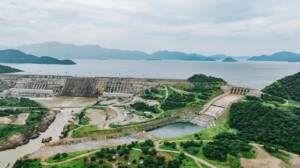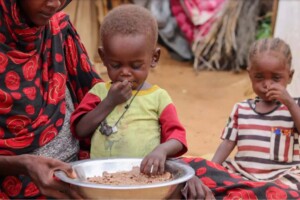Sudan offers more oil blocks to Russian company
Sudan has offered more oil blocks to Russia’s Zarubezhneft oil company at the end of a three-day visit of a high-level Sudanese government delegation to Moscow. The two countries also agreed to enhance cooperation and expand trade in several other sectors.
 Smoke rises after a blast in a quarry at the Ariab mine in eastern Sudan's Red Sea state (File photo)
Smoke rises after a blast in a quarry at the Ariab mine in eastern Sudan's Red Sea state (File photo)
Sudan has offered more oil blocks to Russia’s Zarubezhneft oil company at the end of a three-day visit of a high-level Sudanese government delegation to Moscow. The two countries also agreed to enhance cooperation and expand trade in several other sectors.
On Wednesday, Sudanese-Russian technical talks began in Moscow in preparation for meetings of the Russian-Sudanese intergovernmental commission on Friday.
The Undersecretary of the Ministry of Minerals, Mohamed Saeed Zeinelabdeen affirmed Sudan's readiness to enter into new partnerships with Russia, the Sudan News Agency (SUNA) reported on Thursday.
New oil blocks
El Tahir Mohamed Abulhasan, Director of the Oil Exploration and Production Administration at the Sudanese Ministry of Oil, said at plenary session of the Russian-Sudanese intergovernmental commission on Thursday that they discussed Zarubezhneft's proposal for investments in Sudan.
“We previously provided several blocks for development, and now we have added more in regions with gas and oil potential. I think by October we will pass on the necessary information so that they can start looking at these areas," he stated. At the end of the joint meetings on Friday, he confirmed the deal.
The Interfax Information Services Group on Thursday cited Dmitry Semyonov, head of the Russian Energy Ministry's International Cooperation Department, who said that “the number of oil blocks for development by our Zarubezhneft company, together with Sudan's Energy and Oil Ministry and state company Sudapec, was increased.
“We also agreed with companies to discuss expanding cooperation in the oil sector beyond just production, to look at oil recovery technologies, associated gas utilisation, oil refining, petrochemicals and training,” he said.
Agriculture
Timur Samoletov, representative of the Russian Agriculture Ministry, said on Friday that the expert consultations concluded with a number of agreements, including “solidifying bilateral cooperation in the agro-industrial complex, as well as on increasing and diversifying the turnover of agricultural products".
He said that trade turnover in agricultural products between Russia and Sudan exceeded $287 million in 2021, and that it totalled $137.7 million in January-July 2022, when wheat and sunflower oil, the main export items, with the value of $101 million and $37 million respectively, were supplied to the Sudanese market.
Russia's main imports from Sudan are non-food extracts, natural resins, and live primates. Deliveries increased 51 per cent year-on-year in value terms in January-July, Interfax stated on Friday.
Earlier this month, the Russian-Sudanese joint ministerial committee, in its seventh session, concluded in Moscow with a number of agreements and protocols of joint cooperation in the fields of economy, agriculture, trade, industry, tourism, transport, communications, energy, mining, geology and higher education.
Minister of Minerals, Mohamed Bashir Abu Numou, who signed the agreements on behalf of the Sudanese government, on August 8 affirmed the strong relations between the two countries. According to SUNA, he said that Sudan possesses the capabilities that qualify it to create partnerships with its regional and international surroundings.
On August 3, Russian and Sudanese officials met during the 10th session of the Political Consultation Committee between the Ministries of Foreign Affairs of the Sudan and Russian Federation in Khartoum.
The meeting reviewed ways to strengthen bilateral relations in various sectors, and also completed the ratification procedures of the agreement exempting diplomatic passport holders in the two countries from entry visas.
Enhanced cooperation
The two sides also agreed to enhance the cooperation between the two countries at the United Nations and other international forums.
The military junta governing Sudan has been keen on intensifying its relations with Russia, in particular after the western community, including the World Bank, suspended aid following the coup d’état on October 25 last year. According to the former deputy governor of the Central Bank of Sudan, Sudan has lost $4,364 billion in aid pledged by the international community in the eight months since the coup.
On February 25, a day after Russia invaded Ukraine, a Sudanese delegation headed by Gen Mohamed “Hemeti’ Dagalo, Deputy Chairman of the Sovereignty Council, visited Moscow, where he declared support for Russia’s invasion by saying that Russia had a right to defend itself and its people.
Back in Sudan, Hemeti charted the official Sudan policy on the Russia-Ukraine conflict, and called on the international community to support the dialogue between Russia and Ukraine. He also said that Sudan would let Russia, or any other country open a naval base on the 730-km Red Sea coast, given that it would not threaten Sudan’s national security.
In an extensive report published in end July, CNN accused the Sudanese military rulers of letting Russia “plundering gold in Sudan to boost Putin's war effort in Ukraine”.
Sudan is the second largest gold producer in Africa. The production however is often driven by unregulated, artisanal (individual subsistence) mining, and routine gold smuggling across international borders is a constant problem. Estimates are that between 50 and 80 per cent of Sudan’s gold is smuggled out of the country. It is also known that proceeds have been used to finance internal conflicts.











 and then
and then